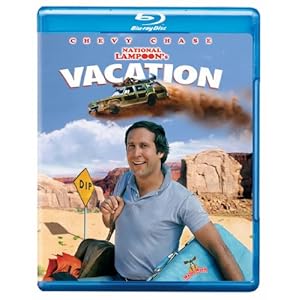

For those of us who aren't jet-setters, the road-trip family vacation is a part of our collective consciousness: piling in a car or van or station wagon and hitting the road to see dubious attractions whilst siblings bicker and parents try to hold it together. John Hughes' short story "Vacation '58," published in the National Lampoon, tapped into this archetypal vein, looking back not in anger but in wry fondness for family foibles. It proved to be lucrative fodder for the big screen (and later small screens), and though lacking in narrative and comic sophistication, National Lampoon's Vacation has something arguably more important: built-in, instant audience identification.
The first film in what turned out to be a franchise has the benefit of Harold Ramis behind the camera, and Vacation has some of the same shaggy appeal as his Caddyshack and Stripes: for better or worse, they're not meticulous pieces of work (they're certainly not over-thought), and yet, they're indelible for their confident, zany approach to a comic premise. Chevy Chase has never been my cup of tea, but it's hard to argue that he's at the top of his form here as goofy patriarch Clark Griswold, a workaholic food-additive developer who sees the family trip to Walley World (home of—ahem—Marty Moose) as a kind of penance for lost time. He's determined to make the trip perfect or—when that hope is dashed—at least to reach their detstination, consarnit! Things begin badly when Eugene Levy's unscrupulous car dealer pawns off on Clark the citrus-y Wagonqueen Family Truckster, a faux-wood-paneled station wagon destined to come apart in pieces. Even as he's being used, Clark insists, "I'm not your ordinary everyday fool." He may be right: in the escalating Murphy's Law scenarios that follow, he proves to be a prize fool.
Chase gets able support from Beverly D'Angelo as patient wife Ellen, Anthony Michael Hall as the scampish Rusty, and Dana Barron as the neglected Audrey. Clark all but steps over his daughter to bond with his son (prefiguring Homer Simpson, Clark forgets Audrey's name); Clark and Rusty's "good talk"s—including "sharing" a beer in Monument Valley—prove to be some of the film's best scenes, though they also reflect the phallo-centrism of the R-rated '80s comedy, with its gratuitous nudity (now, I'm not complaining, mind you) and casual sidelining of the female point-of-view. The film's most prominent running gag preserves Christie Brinkley, in her prime, as the object of male lust, as her character's Ferrari keeps cropping up to tempt Clark to infidelity. (The musical theme implicitly excusing these scenes is "Little Boy Sweet," while the constant repetition of Lindsay Buckingham's "Holiday Road" also helps to give the picture some artificial lift.)
Yet more troubling than the sexism is the scene—played for hilarity—of the white, square, Chicago suburbanites accidentally rolling through "the ghetto" and encountering scary black people. The idea of the Griswolds as tourists who get suckered, squeezed and plain ripped off at every turn could have done without this jive-talking passage. The satire of suburban attitudes remains mostly implicit, though it bubbles to the surface with another race-themed gag: when a Native American sizes up Clark with three little words: "What an asshole."
Lots of the gags in Vacation seem obvious now, though partly because they've been repeated ad nauseam over the years (a random Psycho spoof, defective "magic fingers"...). The best moments are on a realistic scale (an implosive family singalong); the stereotyping of the Griswolds' Kansas cousins as rednecks is more disconcertingly mean than it is funny, but it's there that the road-trippers pick up nasty old Aunt Edna (comedy legend Imogene Coca, cast against type), a font of comedic entanglements. Also among the Kansas cousins: Jane Krakowski's Vicki and Randy Quaid's Eddie, who would become a staple in the ongoing franchise. James Keach, Brian Doyle Murray, John Candy and Eddie Bracken (as conspicuously Disney-esque Roy Walley) turn in amusing cameos, but Chase does most of the comic heavy lifting, most effectively in the area of physical business. By the time his horny hero does what can only be described as a sandwich dance, you might as well give in.

|
|
 |
Warner has done a lovely job in updating National Lampoon's Vacation for hi-def. What's immediately apparent is that the movie retains its film-like texture, with a palpable but never overwhelming veneer of grain. While that may worry some, the image is still boldly colorful and filled with detail and texture. Things get a tad grainier in low light, but that's par for the course; black level is generally strong. This is a handsome, steady, and faithful visual rendition of the film. The lossless DTS-HD MA 1.0 soundtrack won't exactly set home-theater buffs' hearts afire, but it is certainly faithful to the source and entirely serviceable.
"Introduction by Chevy Chase, Randy Quaid, & Matty Simmons" (:44, SD) comes from the 20th Anniversary Special Edition, as does the commentary by Harold Ramis, Chase, Quaid, Anthony Michael Hall, Dana Barron, and producer Simmons. Ramis is recorded separately in the commentary, which is well worth a listen. Ramis offers interesting recollections (and even a mea culpa for the ghetto scene), while the rest chat cheerily, if not very informatively: there's a tendency to just narrate the funny bits and say they're good; still, it's fun to hear the family gently rib each other. And because of the format of the track, the stream of talk seldom lets up.
The disc loses a few micro-featurettes from the DVD editions, but generally, this is a safe upgrade from DVD, especially for the superior image quality.
 |